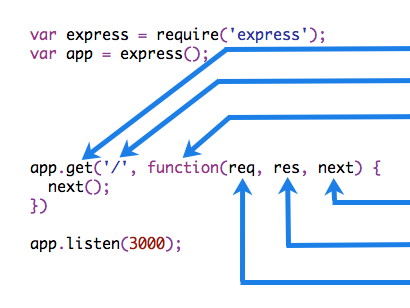Overview
Middleware functions are functions that have access to the request object (req), the response object (res), and the next function in the application’s request-response cycle. The next function is a function in the Express router which, when invoked, executes the middleware succeeding the current middleware.
Middleware functions can perform the following tasks:
- Execute any code.
- Make changes to the request and the response objects.
- End the request-response cycle.
- Call the next middleware in the stack.
If the current middleware function does not end the request-response cycle, it must call next() to pass control to the next middleware function. Otherwise, the request will be left hanging.
The following figure shows the elements of a middleware function call:
 |
HTTP method for which the middleware function applies.
Path (route) for which the middleware function applies.
The middleware function.
Callback argument to the middleware function, called “next” by convention.
HTTP response argument to the middleware function, called “res” by convention.
HTTP request argument to the middleware function, called “req” by convention.
|
Example
Here is an example of a simple “Hello World” Express application. The remainder of this article will define and add two middleware functions to the application: one called myLogger that prints a simple log message and another called requestTime that displays the timestamp of the HTTP request.
var express = require('express')
var app = express()
app.get('/', function (req, res) {
res.send('Hello World!')
})
app.listen(3000)
Middleware function myLogger
Here is a simple example of a middleware function called “myLogger”. This function just prints “LOGGED” when a request to the app passes through it. The middleware function is assigned to a variable named myLogger.
var myLogger = function (req, res, next) {
console.log('LOGGED')
next()
}
Notice the call above to next(). Calling this function invokes the next middleware function in the app. The next() function is not a part of the Node.js or Express API, but is the third argument that is passed to the middleware function. The next() function could be named anything, but by convention it is always named “next”. To avoid confusion, always use this convention.
To load the middleware function, call app.use(), specifying the middleware function. For example, the following code loads the myLoggermiddleware function before the route to the root path (/).

